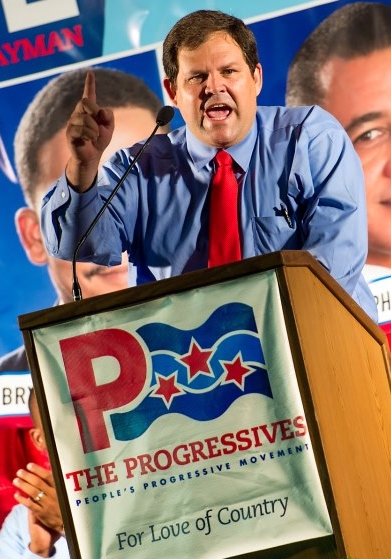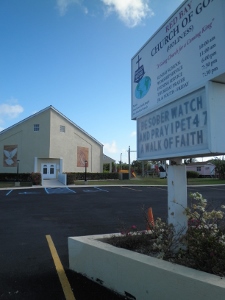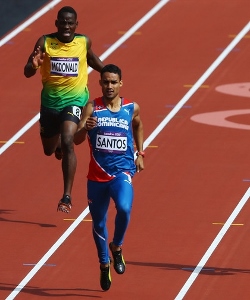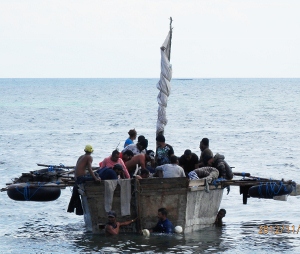Archive for April 18th, 2013

PPM pledges integrity
 (CNS): In a collective pledge made in front of an enthusiastic crowd on Thursday night, all fifteen PPM candidates swore to uphold high ethical standards while serving in office when elected. Led by the party leader, Alden McLaughlin, the largest team running in this election made a public declaration to stand for good governance. At the official PPM national campaign launch, which focused on introducing the Progressive candidates ahead of next week’s manifesto launch, the opposition leader lauded all of the political hopefuls, new and old. In his relatively short address, however, he spoke about the importance of rebuilding the people’s trust in government. (Photo by Mark Lewis)
(CNS): In a collective pledge made in front of an enthusiastic crowd on Thursday night, all fifteen PPM candidates swore to uphold high ethical standards while serving in office when elected. Led by the party leader, Alden McLaughlin, the largest team running in this election made a public declaration to stand for good governance. At the official PPM national campaign launch, which focused on introducing the Progressive candidates ahead of next week’s manifesto launch, the opposition leader lauded all of the political hopefuls, new and old. In his relatively short address, however, he spoke about the importance of rebuilding the people’s trust in government. (Photo by Mark Lewis)
As a party with a reputation for integrity and honesty, McLaughlin said, the pledge was a way of delivering home the message that the PPM would work to restore that trust after four years of an administration tainted with corruption, which culminated in the arrest and charge of the premier for theft and corruption offences.
Speaking in front of a crowd of around 1000 people, McLaughlin said that once a PPM government was returned to office, one of the first things it would aim to do would be to roll back some of the crippling taxes, create better local jobs, set about rebuilding the relationship with the UK and restoring the country’s good name and transparency in government.
McLaughlin reminded the people that it was a PPM government that had introduce the anti-corruption law and the freedom of information legislation, which he said had been critical during the last four years. Without it, he wondered how much more would have been kept from the country about what had gone on under the UDP government.
Stressing the importance of the next election when it comes to regaining integrity in the country’s leaders, McLaughlin said that with 56 candidates 21 of which were in George Town, he understood the confusion among the electorate.
Speaking about the independent vote, McLaughlin pointed out that no other group aside from the PPM and the UDP would be capable of forming a government on 23 May as they did not have enough candidates running.
The next government will need a majority of ten and he said the independents would have to work with one group or another. He said none of them had spoken to the Progressives about working with the PPM post-election, so the question remained which other groups were they speaking to.
McLaughlin made it clear that electing independents wasno guarantee of a coalition but was more likely to guarantee a return to office of the UDP. He said any independent who found him or herself in the Legislative Assembly on 23 May would need to make a deal with nine other people in order to get into government, taking Cayman back to the days of horse trading and losing the independence that they are currently so fiercely guarding.
McLaughlin pointed to the very real danger of voters unintentionally returning a UDP government by voting for disgruntled former UDP candidates running as independents. He said any UDP candidates returned were likely to be looking to join forces with their former members in the PNA and independents who have been past supporters and who could be sucked into a reshaped UDP administration. Those thinking about voting for independents need to ask themselves if that is what should be inflicted on the country again for another four years.

2nd church giving cash back
 (CNS): The Red Bay Church, which was given $100,000 from the controversial Nation Building Fund, has decided to give the money back amidst public controversy over the donation. Premier Juliana O'Connor-Connolly told the press that, while she fully supports the fund, if she is part of any future government she would want to see the cash handed out based on collaboration and not at the discretion of one person. Tourism Minister Cline Glidden confirmed to CNS that, despite claims that a committee had been established to manage the applications and cash distribution, the interim government has found no evidence of this and it appears as if decisions were made directly by former premier McKeeva Bush.
(CNS): The Red Bay Church, which was given $100,000 from the controversial Nation Building Fund, has decided to give the money back amidst public controversy over the donation. Premier Juliana O'Connor-Connolly told the press that, while she fully supports the fund, if she is part of any future government she would want to see the cash handed out based on collaboration and not at the discretion of one person. Tourism Minister Cline Glidden confirmed to CNS that, despite claims that a committee had been established to manage the applications and cash distribution, the interim government has found no evidence of this and it appears as if decisions were made directly by former premier McKeeva Bush.
Last week Hillside Chapel in Cayman Brac became the first church that had received cash from the fund to give the cheque back as a result of negative publicity.
Following the public outcry over an announcement during the official election campaign period that the Red Bay Church of God, which the premier attends, was receiving a $100k grant, the board and membership met and decided to return the funds, O’Connor Connolly said during the Thursday morning press briefing.
She said that while the church was still very much in need, the membership did not wish to put her or the church through any more negative publicity over the money and would instead look for private pledges to help it re-tarmac its car-park, which is prone to flooding, and mend the roof.
The controversy surrounding the church donations flared last week when it was revealed on CNS that the Red Bay Churchhad been informed that is was receiving the money it had requested. By way of explanation, O’Connor-Connolly acknowledged that she attended that church but said the decision had been made several months previously by the former premier.
The new premier said she and her Cabinet colleagues, the "holding government", did not want to overturn the decision about the grant, which had already been conveyed to the church management. As a result, the Red Bay church, Hillside Chapel and a further eight as yet unnamed churches also received donations from the fund in this financial year, all of which were decided by the former premier.
O’Connor-Connolly said that the Red Bay Church was in the process of sending a letter to the Office of the Premier which would accompany the returned cheque. The whole affair had upset the church membership as there was some feeling among the congregation that it had been stirred up by political opponents, she said. In addition, the church had been disappointed that people had conveyed their objection to the donation to the media at the point of the announcement rather than the church board members when the application was being made, the premier said.

Cops arrest two more suspects in GT shooting
(CNS): Police have arrested another two men in connection with the incident last week where shots were fired at police officers at the back of the Lakeside Condos in George Town. The men, aged 23 and 30, are currently in custody following their arrest Thursday morning during a police operation in the George Town area. The 30-year-old has been arrested on suspicion of conspiracy to defeat the ends of justice and the 23-year-old on suspicion of possession of an unlicensed firearm and attempted murder. Four other people were arrested following the incident last week but they have since been released.
Two men were arrested on suspicion of attempted murder last Thursday, 11 April, on the night that armed men fired on police following a car chase. They were released on police bail. To further suspects, a 22-year-old man and a 29-year-old woman, were then arrested on Friday on suspicion of conspiracy to defeat the course of justice and they have also been released on police bail.
Police are also looking for witnesses who may have seen a black Ford Explorer 129 645 from around 6-50pm used by the gunmen and recovered by police. The vehicle crashed through the fence behind Lakeside condos and was abandoned by the occupants, who opened fire on police as they made their escape. The car was parked in Camana Bay cinema car-park.
Anyone who has information in relation to the incident a Lakeside should call George Town police station on 949-4222, the RCIPS tip-line 949-7777 or Crime Stoppers on 800-8477(TIPS).

Athletic meet attracts another Olympic medallist
 (CNS): Luguelin Santos, the 19-year-old Olympic silver medallist from Dominican Republic, will be joining the growing list of world class athletics who will be competing in the second annual Cayman Invitational track and field meet next month. Santos shone at the 2011 Pan-American Games in Mexico, running a personal best of 44.71 seconds in the 400m at just 18 years old. In 2012 he became the World Junior 400m Champion in Barcelona and took silver in the 2012 London Olympics 400m final. Having won only the third medal ever by a Dominican at the Olympic Games, his success instantly propelled him to superstardom in his home country.
(CNS): Luguelin Santos, the 19-year-old Olympic silver medallist from Dominican Republic, will be joining the growing list of world class athletics who will be competing in the second annual Cayman Invitational track and field meet next month. Santos shone at the 2011 Pan-American Games in Mexico, running a personal best of 44.71 seconds in the 400m at just 18 years old. In 2012 he became the World Junior 400m Champion in Barcelona and took silver in the 2012 London Olympics 400m final. Having won only the third medal ever by a Dominican at the Olympic Games, his success instantly propelled him to superstardom in his home country.
Cayman’s Commonwealth Games gold medal-winner, Cydonie Mothersill-Stephens of KyStar Athletics, who has organised the invitational said such a young, accomplished athlete will appeal to the younger generation of athletes here in Cayman.
“Luguelin is an excellent role model for young, aspiring athletes in Cayman. At the age of 19 he already has a number of accolades under his belt. I am sure he will attract lots of interest from young fans,” she said. “We are absolutely delighted to have Luguelin on board and seeing him perform on the day should be a real treat.”
There are still opportunities for sponsorship of the event, which will take place at the Truman Bodden Sports Complex in George Town on 8 May.
For more information visit: www.caymaninvitational.com or email: office@caymaninvitational.com

Non-cash corruption
Many of the headline-grabbing types of corruption that occur around the world seem to involve wads of cash changing hands, or bogus real estate consulting, or curious discounts on luxury condos, or at least a trip to an ATM in a gambling destination. However, some of the most dangerous corrupt acts don’t involve cash or bogus consulting or ATMs.
These non-cash corrupt acts are the ones that make it possible for corrupt politicians to increase their reach and the scope for their corrupt acts. Frequently these non-cash corrupt acts are carried out by public servants eager to gain the favour of corrupt politicians who they see as able to facilitate a fast-track for promotion or appointment. Other times these non-cash corrupt acts are carried out by public servants simply to cover up earlier corruption or illegality.
There are laws against corrupt acts by civil servants and other public servants that apply even when cash is not involved, but sadly, there does not seem to be sufficient interest in enforcing such laws. There are also laws and internal rules against civil servants breaking or ignoring the laws they are supposed to implement, but there does not seem to be significant interest in enforcing those laws and rules either. Too frequently the highest levels in the public service treat laws and internal rules as mere words that they have no need to apply or enforce.
Scruple-challenged public servants see that public service anti-corruption systems are weak. They also see that, contrary to what should happen, corrupt politicians are able to sweep a clear path to promotion for public servants willing to turn a blind eye to illegality, or to act outside the law. It is frequently corrupt public servants that sign cheques and documents that allow public money to be used for illegal purposes, that allow corrupt politicians to do things they shouldn’t do, and that allow corrupt politicians to interfere with and further degrade the public service.
Corrupt politicians and their public service cronies spread like a cancer, degrading public services and destroying the will of honest public servants to resist. The corrupt sub-culture built by corrupt politicians within public services protects its own and prevents the promotion or even continued employment of honest, hard-working public servants. Sadly, it can take as little as a single term for corrupt politicians to bring about significant changes in key public service positions, particularly if corrupt politicians are ruthless and those that are supposed to enforce the law and internal rules and to insure the integrity of the public service are weak, indifferent, or worse.
When those that are supposed to insure the integrity of a public service are weak, indifferent or worse, public servants see honest hard-working public servants who refuse to go along with corruption swept aside, demoted or sent on ‘garden leave’. Sadly, what public servants rarely if ever see is any person, whether in the form of a governor, or an anti-corruption commission, or any other authority, causing the investigation and prosecution of corrupt public servants involved in facilitating, aiding, abetting or covering up the illegal acts of political bosses.
Non-cash corruption leads to the understandable perception that disregard for the law is simply business as usual within a civil service and broader public service. All too frequently, it seems that the civil service and the broader public service do whatever they want, ignoring the law with apparent impunity, secure in their perception that the highest levels in the relevant civil service simply do not require compliance with the law. That must change.
The perception that significant parts of the public services operate outside the law, or are simply too disinterested, unmotivated or incestuously involved to sanction their own, no matter how many laws are broken, is understandable. Proper monitoring and investigation of unlawful behaviour within the public service is frequently not apparent. Thankfully the auditor general and his team look for specific elements of fraud and theft. Without that, it seems that there would be no relevant monitoring or investigation at all.
The complaints commissioner is currently prohibited from accepting complaints of unlawful behaviour within the public service from honest public servants. The police have their hands full dealing with criminals outside the public service, and in any event they simply are not trained to enforce those aspects of either the Public Finance and Management Law or the Public Service Management Law that are the staging areas for corrupt politicians and corrupt public servants.
There is the clear need for a small forensic investigation unit appointed by the governor that is comprised of people from outside the public service knowledgeable in the law applicable to the public service. That unit must be readily accessible to the public and honest public service employees, and must be completely independent of EVERY level of the civil service hierarchy. That unit must be mandated to receive complaints and to investigate all types of illegal acts within every part of the public service, and to share their findings with and to make reasoned recommendations to the governor (at least in the case of corruption or incompetence at the highest levels in the public service), the auditor general, the Anti-Corruption Commission and the director of public prosecutions. Given the millions now lost annually, the unit would be entirely self-financing simply based on the elimination of corrupt wastage of public funds.
There is also a need for very strong whistle-blower protection to protect honest public servants and other members of the public. At present there is no virtually protection from either corrupt politicians or indifferent or corrupt senior public servants. Weak or non-existent whistle-blower legislation is one of the reasons that corruption and indifference to the law now prospers. Some consideration of such legislation is apparently underway under the auspices of the Office of the Complaints Commissioner. That should be supported.
As a Caymanian, it is my fervent hope that strong whistle-blower protection and zero-tolerance for civil servants and other public servants ignoring or breaking the law are both implemented soon. Good governance requires such change, even if it is resisted by the highest levels in the public service.
Are you listening, governor?

UK cash up for grabs for enduring local projects
 (CNS): The Cayman Islands governor is inviting people in the local community to apply for up to $10,000 of free cash to fund community projects. The money comes from the Overseas Territories Programme Fund via the United Kingdom’s FCO and is set aside for proposals which seek to promote good governance and transparency, raise awareness about human rights, protect the environment, reduce crime or improvethe justice system. The annual grants range from CI$1,000 to CI$10,000 and will be awarded to those projects that have the potential to leave a lasting positive impact in Cayman. The governor’s office is now searching for projects to support for the period April 2013 – March 2014.
(CNS): The Cayman Islands governor is inviting people in the local community to apply for up to $10,000 of free cash to fund community projects. The money comes from the Overseas Territories Programme Fund via the United Kingdom’s FCO and is set aside for proposals which seek to promote good governance and transparency, raise awareness about human rights, protect the environment, reduce crime or improvethe justice system. The annual grants range from CI$1,000 to CI$10,000 and will be awarded to those projects that have the potential to leave a lasting positive impact in Cayman. The governor’s office is now searching for projects to support for the period April 2013 – March 2014.
“The 2012 Overseas Territories White Paper aims to strengthen links between the UK and Overseas Territories governments and commits the UK government to provide support to the Overseas Territories governments. This modest fund seeks to do just that by assisting with access to expertise and training. We put it to excellent use last year and we hope to do even better this year,” Duncan Taylor, Cayman’s governor, said in a release on Wednesday.
Last year grants were given to more than half a dozen diverse projects, from documenting orchids to human rights training.
Money was given to train the uniformed services to prepare them for the Bill of Rights; equipment for the Central Caribbean Marine Institute to allow them to study the impact of climate change on our marine ecosystems; support for Brackers Against Alcohol Misuse; assisting the Human Rights Commission for books for primary school children explaining the Bill of Rights; the Gender Equality publicity campaign; development of genetic fingerprints for Cayman’s endangered endemic orchids; and training for those involved in the criminal justice system who work with sex offenders.
Projects must be completed by March 2014 and bids which have already secured some funding from other sources are particularly welcomed. To receive a project bidding form please contact Tom Hines at the Governor’s Office: Tom.Hines@fco.gov.uk, tel. 244 2434.
This information is available on the Governor’s Office website.

Jamaican cops probe Cayman robbery connection
 (CNS): Police in Jamaica investigating a heist in which 16 Rolex watches were stolen from a store in Kingston last week are looking at a possible connection with the robbery at Kirk Freeport in Cayman at the beginning of this year. Some of the two dozen watches taken in that evening’s robbery on 7 January from the store in the Strand Shopping plaza ended up in Jamaica. The Jamaican law enforcement agents believe that the perpetrators behind the robbery are members of a highly organised group and are working with RCIPS to dismantle the group and end the transnational crime.
(CNS): Police in Jamaica investigating a heist in which 16 Rolex watches were stolen from a store in Kingston last week are looking at a possible connection with the robbery at Kirk Freeport in Cayman at the beginning of this year. Some of the two dozen watches taken in that evening’s robbery on 7 January from the store in the Strand Shopping plaza ended up in Jamaica. The Jamaican law enforcement agents believe that the perpetrators behind the robbery are members of a highly organised group and are working with RCIPS to dismantle the group and end the transnational crime.
Although the Kirk robbery involved four masked men, so far police have only charged one local man in connection with the crime and three others were released. A reward of $20,000 was posted by CrimeStoppers and the store for information leading to a conviction.
"Some of the Rolex watches that were stolen in the Cayman Islands recently are here. So we are now looking at previous jewellery-store robberies,” the Flying Squad Unit, Senior Superintendent Cornwall 'Bigga' Ford, told the press in Jamaica on Tuesday.
The authorities there have arrested five suspects in connection with the $7 million theft of watches from the Kingston store and have recovered 13 of the 16 Rolex watches stolen. The Jamaican police also recovered over US$150,000 and J$500,000, an illegal firearm, two licensed shotguns and 500 rounds of assorted ammunition.
Although the crime was perpetrated by just one man, the police believe the jewel heists are being organised by a criminal gang.
The news of more criminal connections between Cayman and Jamaica comes against the backdrop of an ongoing bank robbery trial here, in which one of the five defendants was arrested in Jamaica and extradited to the Cayman Islands. He will now stand trial with four co-defendants in connection with the daylight hold-up at Cayman National Bank in Buckingham Square last June, in which the robbers made off with hundreds of thousands of dollars, despite dropping a large amount of cash during the fumbled escape.
Related articles on CNS:

More refugees returned to Cuba
 (CNS): Despite risking a perilous journey in search of a new life, six Cuban migrants who opted to leave the vessels in which they were travelling were returned to that country this week. Immigration officials confirmed the repatriation Tuesday which brings the number of migrants that have been returned to Cuba this month alone to ten people. At present sixteen other refugees remain at the Immigration Detention Centre on Grand Cayman, after being picked up by officials from boats that have recently passed through Cayman waters.
(CNS): Despite risking a perilous journey in search of a new life, six Cuban migrants who opted to leave the vessels in which they were travelling were returned to that country this week. Immigration officials confirmed the repatriation Tuesday which brings the number of migrants that have been returned to Cuba this month alone to ten people. At present sixteen other refugees remain at the Immigration Detention Centre on Grand Cayman, after being picked up by officials from boats that have recently passed through Cayman waters.